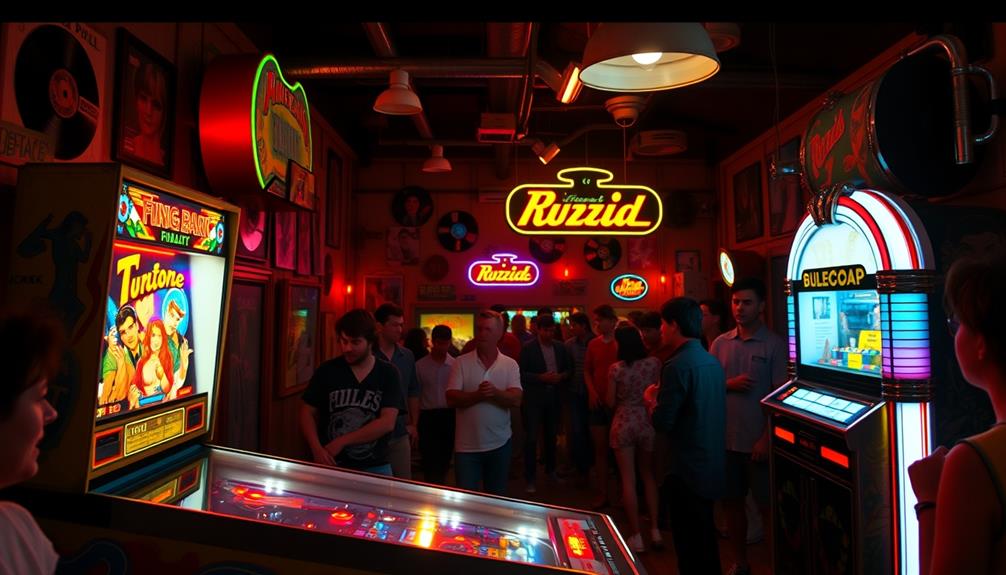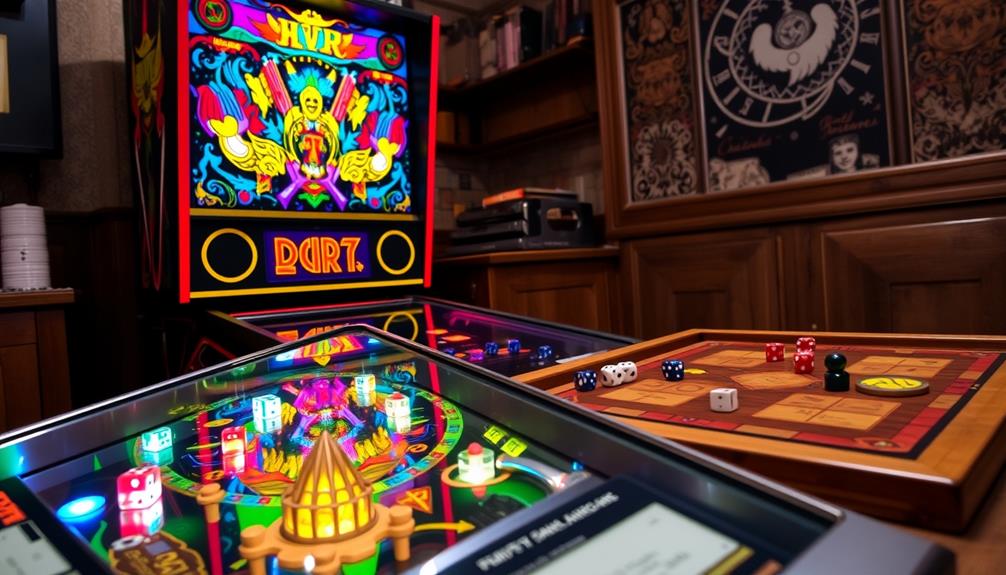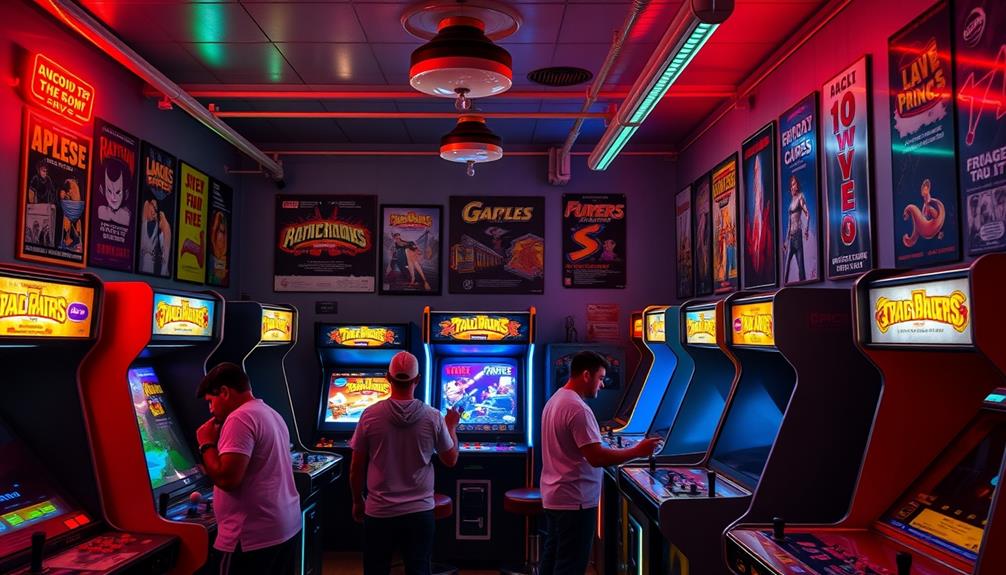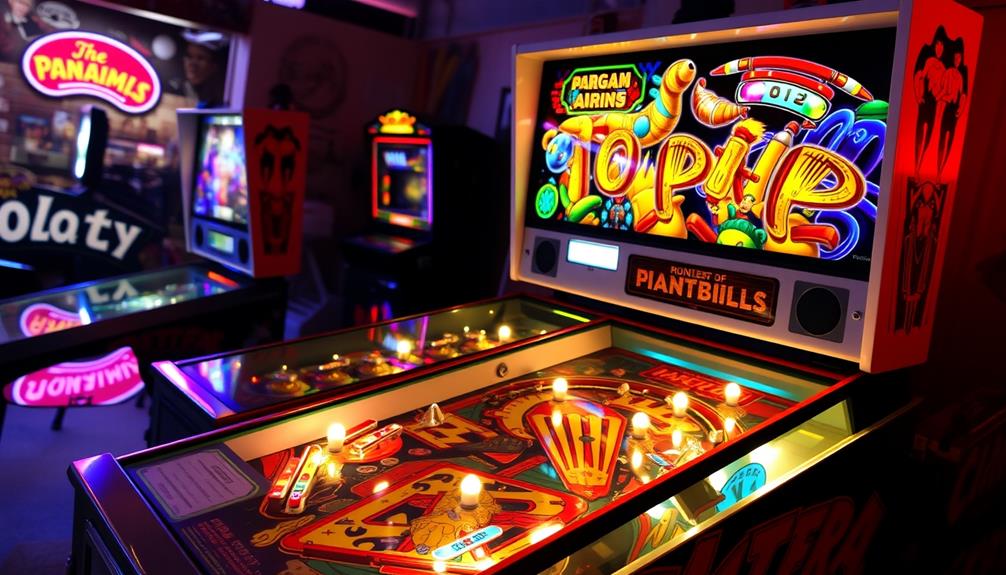Pinball isn’t just another video game; it is a unique experience with a rich history and distinct gameplay mechanics. Unlike video games that rely on digital programming and set objectives, pinball provides real-time, unpredictable action using physical components. Players interact with flippers to guide the ball through the game, keeping it exciting and open-ended until all balls are lost. The game’s charm is rooted in nostalgia and craftsmanship, appealing to a wide range of players across different generations. Even though digital versions of pinball games are available, they still capture the essence of traditional play. Exploring the evolution and community of pinball can be fascinating. For instance, the advent of visual pinball software has allowed players to enjoy classic pinball machines in a digital form. This blend of old-school and modern technology has broadened the appeal of pinball, attracting new fans while keeping long-time enthusiasts engaged. As the pinball community progresses, the enduring allure of the game remains strong.
Key Takeaways
- Pinball machines involve physical components and mechanics, distinguishing them from digital video games that rely on programming.
- Video games typically have fixed objectives and scripted environments, while pinball offers open-ended gameplay with unpredictable ball movement.
- Pinball relies on real-time player interactions, whereas video games use digital tracking for scoring and progress.
- The immersive sensory experience in pinball, driven by mechanical elements, contrasts with the digital graphics and sound of video games.
- While both pinball and video games engage players, pinball is categorized as an arcade game rather than a traditional video game.
The Definition of Video Games
When you think about video games, they're fundamentally electronic games that let you interact with a user interface to create visual feedback on a screen. This interaction typically requires your input to influence the game's outcome, making gameplay a dynamic experience.
Video games can be categorized into various genres, including action, adventure, role-playing, simulation, and sports, each offering unique gameplay mechanics and objectives. In a rapidly changing digital landscape, the emphasis on igniting creativity showcases how video games can serve as tools for innovative expression.
The immersive experience of video games often combines digital graphics and sound, enhancing storytelling, competition, and skill-based challenges. You can engage in single-player modes, where you tackle challenges solo, or multiplayer formats, where you compete or cooperate with others. This diversity allows for rich interactions among players, catering to different tastes and preferences.
Moreover, advances in technology have broadened the platforms available for video games. Whether on consoles, PCs, or mobile devices, you can access a wide range of titles that enhance gameplay experiences.
As you explore this world, it's clear that video games offer a multifaceted form of entertainment that continues to evolve, inviting you to dive deeper into their enchanting domains.
Historical Context of Pinball

The evolution of pinball reflects a rich historical context that intertwines with the development of gaming as a whole. Pinball machines trace their origins back to the 1500s, evolving from outdoor games like bocce and ground billiards into indoor tabletop versions.
The 1930s marked a turning point with the introduction of the first pinball machine, Gottlieb's Baffle Ball, ushering in the coin-operated era. As gaming evolved, concepts such as diversification strategy in investment became relevant, illustrating how entertainment and financial principles can intersect.
Consider these key milestones in pinball's history:
- Origins in garden bowling games: Early forms of pinball emerged from outdoor activities.
- The Chicago manufacturing hub: By 1932, Chicago became the center of pinball production.
- Player-controlled flippers: Introduced in 1947 with Gottlieb's Humpty Dumpty, flippers transformed gameplay.
- Electromechanical to microprocessor shift: This change in the late 1970s enhanced complexity and features.
- Cultural impact: Pinball machines solidified their status in American entertainment.
These developments not only shaped the pinball landscape but also laid the groundwork for modern gaming as we understand it today.
Mechanics and Gameplay Differences

Pinball machines and video games differ considerably in their mechanics and gameplay experiences. Pinball relies on physical components like flippers, bumpers, and a playfield, creating a tactile interaction that immerses you in the game. In contrast, video games depend on digital programming and graphics, offering a scripted environment where outcomes are often pre-defined. The real-time feedback and unpredictability of pinball gameplay can be likened to the high refresh rates found in top projectors for gaming enthusiasts, enhancing the excitement of each play.
When you play pinball, you experience real-time, unpredictable ball movement, which keeps every game fresh and exciting. This spontaneity stands in stark contrast to video games, where levels are usually set with fixed objectives and time constraints. In pinball, you can continue playing until you lose all your balls, providing an open-ended gameplay experience that encourages experimentation.
Moreover, scoring in pinball is linked to your interactions with the physical elements of the machine, while video games typically use digital systems to track your progress within a defined framework. This difference in mechanics and gameplay not only shapes how you engage with each type of game but also highlights the unique appeal of pinball as a sensory experience unlike any video game.
Pinball's Cultural Impact

Pinball machines aren't just games; they evoke a nostalgic arcade experience that connects you to past generations.
The way players physically interact with the machines fosters a sense of creativity and community akin to what's seen in the creative spark of artistic expression.
As you engage with the community through tournaments and competitions, you'll find a sense of camaraderie that's hard to replicate elsewhere.
This blend of physical interaction and social engagement makes pinball a unique cultural phenomenon in today's digital landscape.
Nostalgic Arcade Experience
Many players cherish the nostalgic arcade experience that pinball machines evoke, tapping into a rich history that dates back to the 1930s. For many, these pinball games represent a vibrant part of youth, filled with the sounds and lights that create unforgettable memories.
Unlike many 1990s arcade games that have faded away, pinball machines have maintained their charm and relevance. This enduring popularity can be likened to how celebrities like Nikki Reed and Ian Somerhalder promote a sustainable lifestyle, showcasing the importance of preserving beloved traditions.
The tactile nature of pinball gameplay offers unique experiences that keep players engaged. Here are a few reasons why pinball continues to resonate:
- Artistic Designs: Each machine boasts unique artwork, drawing players in with its visual appeal.
- Mechanical Complexity: The inner workings of pinball machines intrigue those who appreciate craftsmanship.
- Unpredictable Gameplay: The randomness of ball movement offers surprises not found in scripted video games.
- Camaraderie: Sharing fond memories with others creates a sense of community among players.
- Timeless Appeal: Pinball games remain enjoyable across generations, bridging gaps between age groups.
In a world dominated by digital gaming, pinball stands as a nostalgic reminder of simpler times, enchanting new and old players alike.
Community Engagement and Competitions
A vibrant community has emerged around pinball, driven by a shared passion for the game that transcends age and skill levels. Tournaments, much like those found in the unique wedding entertainment ideas sector, play an essential role in this engagement, with local and national leagues organizing events that bring players together for competitive play.
You'll find enthusiasts from diverse backgrounds, all enthusiastic to showcase their skills and connect with others who share their love for pinball.
Online leaderboards and community forums enhance this camaraderie, allowing you to exchange strategies, tips, and personal experiences. Social media platforms further strengthen these connections, enabling players to share machine maintenance advice and highlight their unique collections.
Through these channels, the community fosters an inclusive environment where everyone can learn and grow.
The resurgence of interest in pinball culture has led to the creation of new machines and events, reflecting a strong commitment to preserving and advancing the art of pinball.
As you participate in tournaments and engage with fellow players, you contribute to a thriving culture that celebrates the excitement and nostalgia of pinball, ensuring its legacy continues for generations to come.
Comparison With Digital Pinball Games

When comparing traditional pinball to digital pinball games, it's clear that technology has transformed the way you experience this classic pastime.
Digital pinball, like The Pinball Arcade and Zen Pinball, combines the essence of traditional gameplay with modern advancements, offering unique features that enhance your enjoyment.
The evolution of gaming experiences parallels the innovation seen in various brewing methods, showcasing how traditional practices can adapt to modern preferences.
Here are some key differences you'll notice:
- Realistic Physics: Advanced physics engines simulate authentic ball movement, making gameplay feel true to life.
- Variety of Themes: You can choose from licensed themes and original designs, broadening your options beyond standard tables.
- Achievements: Digital titles often include trophies and achievements, motivating you to keep playing and improving your skills.
- Online Interaction: Features like leaderboards and tournaments foster a sense of community and competition among players.
- Immersive Experiences: With the rise of virtual and augmented reality, digital pinball is becoming more interactive and engaging than ever.
While traditional pinball has its charm, the innovation in digital pinball games offers a fresh perspective that keeps players coming back for more.
Community and Competitive Scene

In the pinball community, tournament participation trends are on the rise, attracting players enthusiastic to showcase their skills.
Many players find that engaging in friendly competitions not only improves their gameplay but also strengthens their bonds within the community.
You can engage with online leaderboards to see how your scores stack up against others, adding a layer of excitement to the competition.
This vibrant scene not only fosters camaraderie among enthusiasts but also elevates the overall experience of pinball.
For those interested in enhancing their gameplay, exploring yoga for back pain can offer holistic management strategies to stay fit and focused.
Tournament Participation Trends
Increasingly, pinball tournaments are becoming a staple in the gaming community, drawing players from all backgrounds to compete at various skill levels. The surge in popularity of these events is evident, with organizations like the Professional and Amateur Pinball Association (PAPA) and the International Flipper Pinball Association (IFPA) leading the charge.
This rising trend mirrors the growth seen in other gaming communities, where self-awareness and interpersonal relationships are enhanced through competitive play.
Here are some trends in tournament participation:
- Diverse Skill Levels: Players from beginners to pros compete, ensuring a welcoming atmosphere.
- Global Reach: Over 400 IFPA-sanctioned tournaments were held worldwide in 2022, showcasing the international appeal.
- Incentives: Major tournaments often offer cash prizes and trophies, motivating players to hone their skills.
- Community Engagement: Players regularly participate in local and national tournaments, building camaraderie.
- Competitive Growth: The IFPA's global ranking system tracks players, encouraging ongoing participation and improvement.
As you immerse yourself in the pinball scene, you'll find that these tournaments not only highlight individual talents but also strengthen the vibrant pinball community.
Whether you're a seasoned player or just starting, there's a place for you in the exhilarating world of pinball tournaments.
Online Leaderboard Engagement
Engaging with online leaderboards in pinball video games opens up a dynamic way for players to showcase their skills and compete globally. Whether you're playing Zen Pinball or Pinball FX, these online leaderboards foster a vibrant community where you can chase high scores and improve your rankings.
It's all about pushing your limits and seeing where you stand among other players, as studies suggest a correlation between competition and perceived attractiveness in gaming communities astrological signs and perceived beauty.
Tournaments often leverage these online leaderboards to track performance, adding a structured competitive element to the pinball simulation experience. You can compete for daily, weekly, or all-time high scores, offering various ways to measure your accomplishments. This variety keeps the competition fresh and motivates you to keep coming back.
Moreover, social features enhance community engagement by allowing you to share your scores on social media platforms. This not only sparks friendly rivalry but also creates a sense of camaraderie among players.
When you see friends and fellow players climbing the ranks, it fuels your desire to improve. Ultimately, online leaderboards serve as both a competitive arena and a community hub, making pinball video games an engaging experience for all.
The Future of Pinball

Pinball's future looks bright as innovative manufacturers like Jersey Jack Pinball and Spooky Pinball breathe new life into the classic game.
With the integration of digital technology, pinball is evolving rapidly, making it more engaging than ever. Here's what you can expect in the future:
- Enhanced gameplay: New machines feature LCD screens and interactive elements, elevating the gaming experience.
- Craftsmanship appreciation: A growing interest in the artistry and mechanics of pinball machines is reviving popularity among enthusiasts.
- Community connection: Social media and tournaments are fostering a vibrant culture, encouraging players to share experiences and tips.
- Immersive technologies: The incorporation of augmented reality (AR) and virtual reality (VR) hints at exciting possibilities for gameplay.
- Home ownership trend: As location-based venues decline, more players are investing in home consoles for personal pinball collections.
This combination of innovation and community engagement suggests that pinball won't only survive but thrive in the coming years, making it a compelling hobby for both new and seasoned players alike.
Embrace this evolution and get ready for the future of pinball!
Frequently Asked Questions
Are Pinball Machines Considered Video Games?
You might think pinball machines qualify as video games, but they rely on mechanical parts and physical interaction instead of digital interfaces. Most players view them as a unique arcade experience, distinct from traditional video games.
What Kind of Game Is Pinball?
Pinball's a unique game that blends mechanical and digital elements. You control the ball using flippers, experiencing real-time action. Its tactile feedback and intricate design set it apart from traditional video games, creating an engaging experience.
Are Arcades Considered Video Games?
Arcades aren't solely considered video games. They host a mix of mechanical and digital games, offering diverse experiences. You'll find video games alongside pinball machines, making arcades appealing to all types of gaming enthusiasts.
Why Did Pinball Get Banned?
Pinball got banned due to perceptions of it being a game of chance, tied to gambling concerns and organized crime. Local politicians and law enforcement argued it led to illegal activities, prompting widespread prohibitions in various cities.
Conclusion
In the end, pinball isn't just a game; it's an experience that bridges the gap between traditional and digital play. While it may not fit the classic definition of a video game, its mechanics and cultural significance are undeniable. As the saying goes, "You can't teach an old dog new tricks," but pinball continues to evolve, drawing in new players and blending nostalgia with innovation. So, whether you prefer the arcade or a screen, pinball's future looks bright.








